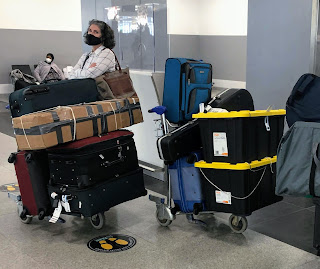I was excited to visit what I believed to be an arts and craft market to get a picture of local culture as well as pick up some decorative items for my apartment in Abuja. I had visions of something similar to the 'hippy fair' in Brasilia where tourist can pick up leather goods, jewelry, and perhaps a capoeira demonstration.
The Mama Africa Arts and Crafts, or Jabi Art Market, does not exactly cry out to tourists. One would hardly take the cluster of shabby canvas covered shacks for a place to buy souvenirs. As one reviewer described it: Excellent works of art and craft can be found here at reasonable prices. However, the area is reminiscent of a transit camp and needs intervention of a befitting premises. Recommended to visit.
We glanced quickly at the wooden furniture, and dove into the 'camp'. Jon and I have learned not to show too much interest in items early on, or the vendors will make it difficult for us to move on to other stalls. We also new that prices were 'negotiable', and haggling was the norm. I have never been too good at this sort of bargaining, and so was careful to point out that I was "just looking". Each vendor tried their best to get us into their stall, but they in no way aggressive, and gave us space.
Honestly, I couldn't at first see anything I would buy. I was more interested in the colors and variety, the basket weaving activity, and staying cool. I finally decided on a couple of key chains (very necessary!), two baskets (more decorative), and a fan (both decorative and necessary). I was quite proud of myself for getting the price down 1000 NGN on the baskets, but the fan guy was proving to be quite difficult.

Only when I had given up and walked away, did he concede to my 'best price' of 1500 NGN. The win was short lived, for as soon as I got back on our bus, the fan guy came after me with his friend. They circled the bus looking for me, tapped on the window, and explained to anyone who would listen that they needed more money for the fan. He was selling for his friend, and his friend wanted more. I was safe inside the bus, money had already changed hands, surely he would give up. But he was determined, and even acted out a fight scene with the friend, trying to get my attention. In hindsight, I should have simply offered a bit more money, another dollar probably would have ended it.
Unfortunately, the business of haggling for a price, detracts from the actual value of the crafts. I would have rather have learned about the origin and process of the varied pieces, about the artists and their culture, about the way these artisans are treated in Abuja. Next time.
Next we visited the Maitama Farmer's Market. If you aren't distracted by the armed guard, and large chunks of dried mystery meat, then you can take in the huge variety of fruit and vegetables. Again, I will use the words of another reviewer:
This place is really good, the amazingly healthy veggies and fruits and luxurious colours of their skin is totally worth the drive. You will think the foods are plastic cause of how fresh and good they looked. And here, we were warned, there was no haggling! I found my okra, bananas and limes. Jon was denied his mangoes (out of season) and tomatoes (he tried to haggle the price down).
Our final purchases came from a small market store, that sold imported items like British biscuits and American cans of creamed corn. Jon was happy to find a large jar of honey that we purchased from a sales girl squeezed into a corner of the tight space. Only after walking out did we realize that we had paid over $60! On inspecting the receipt we saw that the honey cost over $30. Naturally, we tried to take the honey back. Unfortunately the sales girl had already shoved the large amount of cash into a slot in the safe. So Jon had to wait until someone else bought the honey's price with cash before she could refund him.

At the end of the day, I realized that the experience had been more about business tactics, prices and money conversions. It is hard to look past how much you are spending to what you are getting. Fortunately we didn't venture out alone, but with a group of veteran overseas teachers. One wise college, spoke from experience about her last move: " I had to put a conscious stop to the constant converting of local currency into US dollars in my head when I was out and about. That was the only way I could enjoy myself in my new surroundings."











